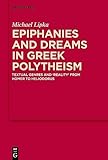Epiphanies and Dreams in Greek Polytheism : Textual Genres and 'Reality' from Homer to Heliodorus / Michael Lipka.
Material type: TextSeries: MythosEikonPoiesis ; 13Publisher: Berlin ; Boston : De Gruyter, [2021]Copyright date: ©2022Description: 1 online resource (IX, 319 p.)Content type:
TextSeries: MythosEikonPoiesis ; 13Publisher: Berlin ; Boston : De Gruyter, [2021]Copyright date: ©2022Description: 1 online resource (IX, 319 p.)Content type: - 9783110636369
- 9783110639162
- 9783110638851
- Classical literature -- History and criticism
- Dreams in literature
- Dreams -- Religious aspects
- Epiphanies in literature
- Epiphanies
- Gods, Greek
- Greek literature -- History and criticism
- Mythology, Greek
- Epiphanie
- Griechische Antike
- Polytheismus
- Traumdeutung
- LITERARY CRITICISM / Ancient & Classical
- Polytheism
- ancient Greek religion
- dream divination
- ephiphany
- 881/.010938 23
- BL783 .L57 2022
- online - DeGruyter
- Issued also in print.
| Item type | Current library | Call number | URL | Status | Notes | Barcode | |
|---|---|---|---|---|---|---|---|
 eBook
eBook
|
Biblioteca "Angelicum" Pont. Univ. S.Tommaso d'Aquino Nuvola online | online - DeGruyter (Browse shelf(Opens below)) | Online access | Not for loan (Accesso limitato) | Accesso per gli utenti autorizzati / Access for authorized users | (dgr)9783110638851 |
Browsing Biblioteca "Angelicum" Pont. Univ. S.Tommaso d'Aquino shelves, Shelving location: Nuvola online Close shelf browser (Hides shelf browser)
Frontmatter -- Foreword and Acknowledgements -- Contents -- Introduction -- Epic -- Narrative Hymns -- Didactic Poetry -- Sappho’s Lyric -- Drama -- Historiography -- Historical Biography -- Periegesis -- Autobiography -- Epigraphic Genres -- Erotic Novel -- Medical and Philosophical Treatises on Dreams -- Neoplatonic Treatises -- Magical Recipes -- Conclusions -- Bibliography -- General Index -- Index of Ancient Sources
restricted access online access with authorization star
http://purl.org/coar/access_right/c_16ec
While modern students of Greek religion are alert to the occasion-boundedness of epiphanies and divinatory dreams in Greek polytheism, they are curiously indifferent to the generic parameters of the relevant textual representations on which they build their argument. Instead, generic questions are normally left to the literary critic, who in turn is less interested in religion. To evaluate the relation of epiphanies and divinatory dreams to Greek polytheism, the book investigates relevant representations through all major textual genres in pagan antiquity. The evidence of the investigated genres suggests that the ‘epiphany-mindedness’ of the Greeks, postulated by most modern critics, is largely an academic chimaera, a late-comer of Christianizing 19th-century-scholarship. It is primarily founded on a misinterpretation of Homer’s notorious anthropomorphism (in the Iliad and Odyssey but also in the Homeric Hymns). This anthropomorphism, which is keenly absorbed by Greek drama and figural art, has very little to do with the religious lifeworld experience of the ancient Greeks, as it appears in other genres. By contrast, throughout all textual genres investigated here, divinatory dreams are represented as an ordinary and real part of the ancient Greeks' lifeworld experience.
Issued also in print.
Mode of access: Internet via World Wide Web.
In English.
Description based on online resource; title from PDF title page (publisher's Web site, viewed 28. Feb 2023)









